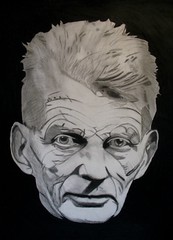Samuel B. Beckett (1906 – 1989) was an Irish avant-garde novelist, playwright, theatre director, and poet who lived in France for most of his adult life, says Wikipedia. He wrote in both English and French.
His work offers a bleak, tragicomic outlook on human nature, often coupled with black comedy and gallows humour.
Beckett is widely regarded as among the most influential writers of the 20th century.[2] He was strongly influenced by Irish novelist James Joyce, author of novels Ulysses (1922) and Finnegan's Wake (1939) - notable for their stream-of-consciousness prose.
He is one of the key writers in the "Theatre of the Absurd". His work became increasingly minimalist in his later career.
In his play Waiting for Godot (1953; originally "En Attendant Godot," en Francais) a critic wrote that Beckett "has achieved a theoretical impossibility—a play in which nothing happens, that yet keeps audiences glued to their seats. What's more, since the second act is a subtly different reprise of the first, he has written a play in which nothing happens, twice."[20]
Broadly speaking, Godot and plays such as "Krapp's Last Tape" deal with the subject of despair and the will to survive in spite of that despair, in the face of an uncomprehending and incomprehensible world.
Beckett's work represents the most sustained attack on the realist tradition. He opened up the possibility of theatre and fiction that dispense with conventional plot, time and place in order to focus on essential components of the human condition.
In 1969 Beckett heard that he had won the Nobel Prize for Literature. Anticipating that her intensely private husband would be saddled with fame from that moment on, Suzanne called the award a "catastrophe".[23] In true ascetic fashion, he gave away all of the prize money.

No comments:
Post a Comment